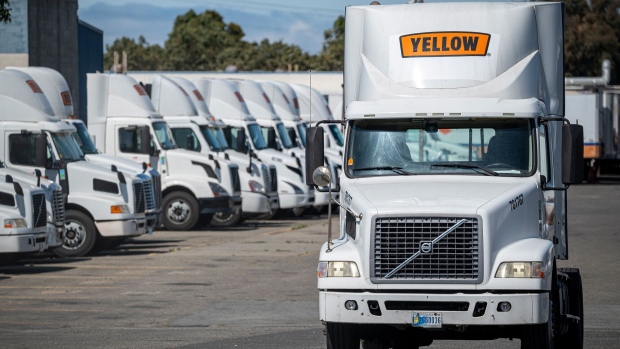Aug 7, 2023
Teamsters Deny Yellow’s Claim That Union Caused Trucking Firm’s Bankruptcy
, Bloomberg News

(Bloomberg) -- The International Brotherhood of Teamsters balked at Yellow Corp.’s efforts to blame the union for financial woes that sent the short-haul trucker spiraling into bankruptcy.
Teamsters President Sean O’Brien said Monday that the union “sacrificed billions” to keep Yellow afloat even as the firm “blew through a $700 million government bailout.” The company for years used its financial troubles to extract concessions from workers, he said.
“Yellow’s dysfunctional, greedy C-suite failed to take responsibility for squandering all that cash,” O’Brien said in a statement. “They still don’t.”
Yellow’s management has had scathing criticism for the Teamsters in the wake of its demise, including an Aug. 6 filing in which Chief Executive Officer Darren Hawkins said the company’s financial debacle was caused by the union’s “bullying and deliberately destructive tactics.” In sworn testimony on Aug. 7, Chief Restructuring Officer Matt Doheny accused O’Brien of using the company “as a sacrificial lamb” and said the Teamsters chief would rather “see Yellow destroyed than be perceived as weak in negotiations.”
The Nashville-based company filed for Chapter 11 bankruptcy as it seeks to sell assets to cover a $737 million loan from the US government and $485 million of debt from private lenders. The US’s third-largest less-than-truckload carrier began winding down operations last week, throwing 30,000 people, including 22,000 union members, out of work.
Yellow at one point was US’s largest trucking company by sales after an acquisition spree in the early 2000s that saddled the company with debt. Then the financial crisis forced bondholders to swap debt for equity to keep the trucker afloat. Losses piled up and the company had to restructure its debt again in 2011.
During the pandemic, the US government provided Yellow with an emergency loan that the administration said was needed to protect Defense Department suppliers. As part of that deal, the US Treasury took an equity stake of about 30% in the company.
Read More: Yellow’s Downfall Throws $700 Million US Covid Loan in Jeopardy
Combining Units
Yellow’s management sought to save the company by combining its different trucking units, which mostly have operated separately since the acquisitions, a plan that would have increased efficiency. To implement the plan, Hawkins needed the union to sign off on the changes. The two sides agreed to open their labor contract about a year early to discuss the plan, but those talks never got off the ground.
The union threatened to strike after the company said it needed to defer a $50 million payment to a centralized pension fund and, in turn, the company sued the union for not negotiating in good faith. That strike was averted after the pension fund operator gave the company more time while keeping worker benefits intact. But customers began to leave, forcing the company to file for creditor protection.
The union points to two labor agreements, ratified in July for the less-than-truckload units of ArcBest Corp. and TFI International, to rebut Yellow’s accusation that the Teamsters weren’t willing to negotiate in good faith. The units of ArcBest and TFI both pay their union workers more than Yellow does, the union has said.
Yellow had said the union was using Yellow’s situation in talks with other companies. The Teamsters reached a tentative agreement in July with United Parcel Service Inc.
Read More: ‘They Blinked’: UPS Call Led to $30 Billion Teamsters Win
“When mismanaged companies like Yellow cry about needing more flexibility to modernize, they’re telling you they want to take advantage of workers,” said Fred Zuckerman, general secretary-treasurer of the Teamsters, in a statement. “Yellow benefitted from historically low labor costs compared to other freight leaders, yet they still managed to drive the company into the ground.”
Yellow has an incentive to break the company into pieces — or restructure it into something unrecognizable — to avoid its obligation to the Teamsters’ collective bargaining agreement, said Bruce Markell, a former bankruptcy judge who now teaches at Northwestern University’s Pritzker School of Law. Federal law requires new business owners to honor existing labor agreements if operations stay more or less the same, but they may toss out labor contracts if the workforce changes substantially.
It is rare for a union to drag a company to insolvency, Markell said, yet they often are left empty-handed in bankruptcy because other creditors are given priority.
“I used to say ‘welcome to the land of broken promises,’ because that’s what bankruptcy is,” Markell said.
--With assistance from Jeremy Hill.
(Adds commentary from bankruptcy expert in final three paragraphs.)
©2023 Bloomberg L.P.






